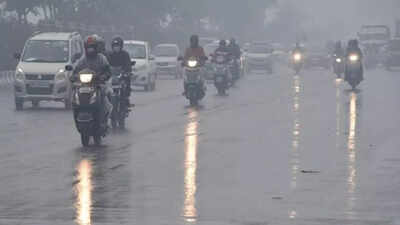Top Searches
- News
- City News
- delhi News
- Light rain likely on Sunday, AQI ‘severe’ in Delhi
Light rain likely on Sunday, AQI ‘severe’ in Delhi
Light rain likely on Sunday, AQI ‘severe’ in Delhi

In the meantime, India Meteorological Department (IMD) has forecast moderate-to-light rain from Sunday. (Image used for representational purpose only)
NEW DELHI: Delhi’s air quality remained “severe” for the fourth day in a row due to unsupportive weather conditions. However, slight better weather conditions on Friday led to a marginal improvement in the air quality index (AQI) within the “severe” category.
According to Central Pollution Control Board, AQI, on a scale of 0 to 500, was 415 as against 423 on Thursday and 407 a day before that. The pollution monitoring agencies predicted better ventilation over the next few days.
Track the pollution level in your city
In the meantime, India Meteorological Department (IMD) has forecast moderate-to-light rain from Sunday. “The easterly winds will continue for another few days till December 29. After that there will be icy westerly winds, but the speed will be less. So there will be no cold wave at least till January 3 or 4,” said R K Jenamani, senior scientist at IMD.
On Friday, the city recorded the maximum and minimum temperatures at 22.9 degrees Celsius and 6.9 degrees, as against 23.1 and 5.5 degrees a day earlier. According to IMD, the maximum and minimum are likely to hover around 23 and 8 degrees Celsius on Saturday.
The national capital has been witnessing “severe” air quality since December 21 as an active western disturbance led to a drop in the wind speed and rise in humidity, leading to poor ventilation and more accumulation of the pollutants getting generated locally and from neighbouring NCR towns.
The particle pollutants, primarily PM2.5, saw slight improvement over the day. PM2.5 dropped to 239 micrograms per cubic metres by 8pm from 284.5 units in the evening, as against the safe limit of 60.
According to System of Air Quality and Weather Forecasting and Research, the air quality is likely to improve from Saturday due to better ventilation of pollutants and the winds. “Increased ventilation, mixing with air-mass above boundary layer and moist condition will reduce AQI from December 25,” it stated.
According to the Union earth sciences ministry’s Decision Support System for Air Quality Management of Delhi, both local and external emission sources affected the city’s air quality. The local transport, industries, residential emissions and construction remained the major contributors to the city’s overall PM2.5, while in the rest of NCR, the major contributors were Ghaziabad, Noida and Bulandshahr districts.
According to Central Pollution Control Board, AQI, on a scale of 0 to 500, was 415 as against 423 on Thursday and 407 a day before that. The pollution monitoring agencies predicted better ventilation over the next few days.
Track the pollution level in your city
In the meantime, India Meteorological Department (IMD) has forecast moderate-to-light rain from Sunday. “The easterly winds will continue for another few days till December 29. After that there will be icy westerly winds, but the speed will be less. So there will be no cold wave at least till January 3 or 4,” said R K Jenamani, senior scientist at IMD.
On Friday, the city recorded the maximum and minimum temperatures at 22.9 degrees Celsius and 6.9 degrees, as against 23.1 and 5.5 degrees a day earlier. According to IMD, the maximum and minimum are likely to hover around 23 and 8 degrees Celsius on Saturday.
The national capital has been witnessing “severe” air quality since December 21 as an active western disturbance led to a drop in the wind speed and rise in humidity, leading to poor ventilation and more accumulation of the pollutants getting generated locally and from neighbouring NCR towns.
The particle pollutants, primarily PM2.5, saw slight improvement over the day. PM2.5 dropped to 239 micrograms per cubic metres by 8pm from 284.5 units in the evening, as against the safe limit of 60.
According to System of Air Quality and Weather Forecasting and Research, the air quality is likely to improve from Saturday due to better ventilation of pollutants and the winds. “Increased ventilation, mixing with air-mass above boundary layer and moist condition will reduce AQI from December 25,” it stated.
According to the Union earth sciences ministry’s Decision Support System for Air Quality Management of Delhi, both local and external emission sources affected the city’s air quality. The local transport, industries, residential emissions and construction remained the major contributors to the city’s overall PM2.5, while in the rest of NCR, the major contributors were Ghaziabad, Noida and Bulandshahr districts.
FacebookTwitterLinkedinEMail
Start a Conversation
end of article

